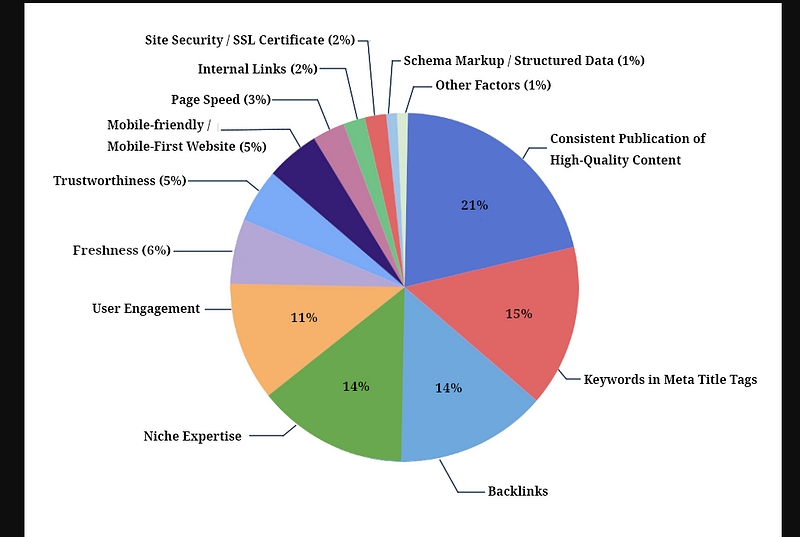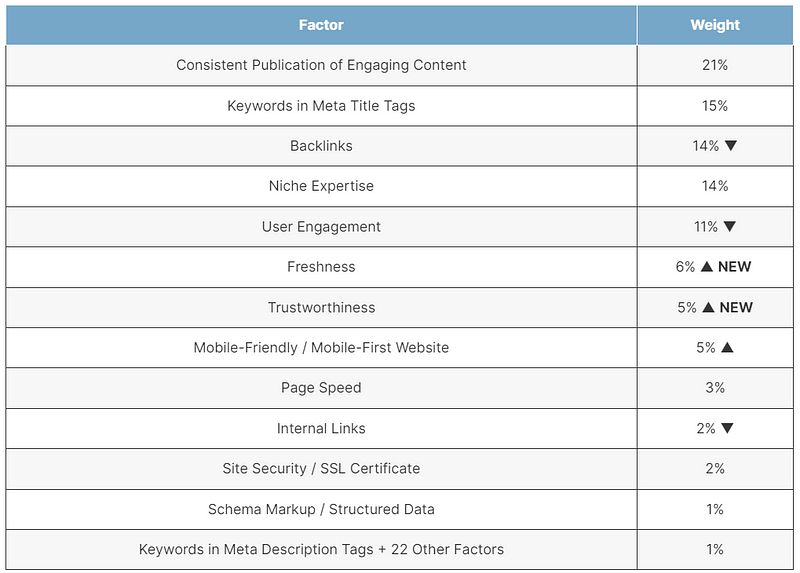The 2024 Google Algorithm Ranking Factors
The updates and changes Google has made to its algorithm as of the first quarter of 2024, compared to the first quarter of 2023, are as…


The updates and changes Google has made to its algorithm as of the first quarter of 2024, compared to the first quarter of 2023, are as follows:
1. Freshness jumped from the “other” category, which originally accounted for less than 1% of the algorithm, to now becoming the sixth largest factor in the algorithm, accounting for 6%.
Over the past two quarters, our data shows that website pages that are updated at least once a year can improve their rankings in search engine results pages (SERPs) by an average of 4.6 positions, compared with those that are not updated. promote. Most likely, quarterly or monthly updates will provide greater benefits.
2. In the first quarter, trust emerged as a new factor in Google’s algorithm, accounting for 5% of the total.
The change comes after Google filed for a patent for artificial intelligence technology used to determine the factuality of content and rolled out a “Your Money Your Life” algorithm update that scrutinizes websites offering advice on financial and health topics. page.
3. By 2024, the share of backlinks has dropped by one percentage point (from 15% to 14%), highlighting that a factor that once accounted for more than 50% of the algorithm is still important, although not nearly as critical as before.
As the third most important algorithmic factor, backlinks are still important, but they represent an era in which Google’s artificial intelligence was not mature enough to independently assess the quality and trustworthiness of a web page’s content and required other sites to do so. Get the job done. It has ceded status to relatively new factors, namely domain expertise and credibility.
4. The value of user engagement has declined slightly (from 12% to 11%), but it will still be the fifth most important factor in Google’s algorithm in Q1 2024, alongside core factors such as backlinks and title tags. Keywords are in the same echelon.
This is a factor that has continued to grow over the past three years, so it’s fair to say that creating responses that best meet searcher intent — whether explicit or implicit — should be a primary focus for content creators.
5. Segment expertise remains unchanged at 14%, continuing to emphasize the importance of hub and spoke SEO, which is one of the most important SEO strategies that has emerged in the past decade.
Hub and spoke SEO is the practice of creating high-level pages targeting primary keywords and linking to a series of secondary pages targeting closely related keywords.
6. In October 2023, mobile priority will be improved, marking the completion of Google’s complete transition to mobile-first indexing.
This means that Google will consider the mobile version before considering the desktop version of every page on your site, making sure your site offers a good mobile experience if you want to maintain full ranking power.
7. Continuously publishing attractive content is still the first element.
Google continues to reward producers who consistently produce high-quality information by getting those sites indexed faster and ranking higher. More quality content also means more opportunities to attract backlinks, which is another major factor in building trust with Google.
8. Keywords in meta titles will remain at 15% in 2024, and Google will slightly relax the definition of word differences in the first quarter of 2023.
Where before the difference between “buying a webcam” and “buying webcams” was clear, now it’s less so. Regardless of how weighted this factor is in the algorithm, it is still necessary for first ranking.
9. The share of internal links fell by 1 percentage point to 2% as they ceded some share to credibility in the first quarter of 2023 and to mobile friendliness in the third quarter.
While Google Trust is still passed between website pages, it doesn’t signal Google as much as it did in years past.
10. Keywords in title tags and keywords in URLs have been eliminated as one factor, relegated to the group of 22 factors that make up only 1% of the algorithm’s total.